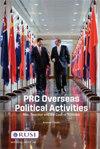III. The Nordic Region
Q4 Social Sciences
引用次数: 1
Abstract
The Nordic Region is peaceful and prosperous, with few internal or international conflicts. Denmark, Finland, Iceland, Norway and Sweden have many similarities in culture, traditions and social structure. The five countries cooperate extensively in almost all sectors of private and public affairs. The Nordic Council, with its multiple committees and forums at the governmental, ministerial and even parliamentary levels, plays a significant role in promoting cohesion. Although defence is not explicitly a focus of the Nordic Council, the last few years have witnessed increased cooperation in the areas of operations, logistics and information sharing. The Nordic countries find cooperation valuable as an objective in itself, but especially as a means for strengthening defence within the larger Western security framework. Lately, both Finland and Sweden have deepened their ties with NATO, and the US specifically. Indeed, each of the Nordic countries have strengthened their bilateral relations with each other and other Western states since the Russian annexation of Crimea in 2014. Prospects for further Nordic cooperation are bright but have limitations in practice as neither Finland nor Sweden is likely to join NATO in the near future. Thus, cooperation will focus on common exercises and training, and on collaboration in international operations and crisis management, while agreements on procurement of military equipment will probably remain relatively rare. This chapter focuses on defence and security cooperation in the Nordic area, providing context, identifying challenges and suggesting possibilities for the way forward.3北欧地区
北欧地区和平繁荣,很少发生国内或国际冲突。丹麦、芬兰、冰岛、挪威和瑞典在文化、传统和社会结构方面有许多相似之处。这五个国家在几乎所有的私人和公共事务部门都进行了广泛的合作。北欧理事会拥有政府、部长级甚至议会级的多个委员会和论坛,在促进凝聚力方面发挥着重要作用。尽管国防不是北欧理事会的明确重点,但在过去几年中,在行动、后勤和信息共享领域的合作有所增加。北欧国家认为,合作本身就是一个有价值的目标,但尤其是作为在更大的西方安全框架内加强防御的一种手段。最近,芬兰和瑞典都加深了与北约的关系,尤其是与美国的关系。事实上,自2014年俄罗斯吞并克里米亚以来,每个北欧国家都加强了彼此和其他西方国家的双边关系。北欧进一步合作的前景是光明的,但在实践中存在局限性,因为芬兰和瑞典都不太可能在不久的将来加入北约。因此,合作将侧重于共同演习和训练,以及在国际行动和危机管理方面的合作,而关于军事装备采购的协议可能仍然相对罕见。本章侧重于北欧地区的防务和安全合作,提供背景,确定挑战,并提出前进道路的可能性。
本文章由计算机程序翻译,如有差异,请以英文原文为准。
求助全文
约1分钟内获得全文
求助全文
来源期刊

Whitehall Papers
Social Sciences-Archeology
自引率
0.00%
发文量
12
期刊介绍:
The Whitehall Paper series provides in-depth studies of specific developments, issues or themes in the field of national and international defence and security. Published three times a year, Whitehall Papers reflect the highest standards of original research and analysis, and are invaluable background material for policy-makers and specialists alike.
 求助内容:
求助内容: 应助结果提醒方式:
应助结果提醒方式:


